
How To Choose A Research Topic
Step-By-Step Tutorial With Examples + Free Topic Evaluator
By: Derek Jansen (MBA) | Expert Reviewer: Dr Eunice Rautenbach | April 2024
Choosing the right research topic is likely the most important decision you’ll make on your dissertation or thesis journey. To make the right choice, you need to take a systematic approach and evaluate each of your candidate ideas across a consistent set of criteria. In this tutorial, we’ll unpack five essential criteria that will help you evaluate your prospective research ideas and choose a winner.
Overview: The “Big 5” Key Criteria
- Topic originality or novelty
- Value and significance
- Access to data and equipment
- Time limitations and implications
- Ethical requirements and constraints
Criterion #1: Originality & Novelty
As we’ve discussed extensively on this blog, originality in a research topic is essential. In other words, you need a clear research gap . The uniqueness of your topic determines its contribution to the field and its potential to stand out in the academic community. So, for each of your prospective topics, ask yourself the following questions:
- What research gap and research problem am I filling?
- Does my topic offer new insights?
- Am I combining existing ideas in a unique way?
- Am I taking a unique methodological approach?
To objectively evaluate the originality of each of your topic candidates, rate them on these aspects. This process will not only help in choosing a topic that stands out, but also one that can capture the interest of your audience and possibly contribute significantly to the field of study – which brings us to our next criterion.

Criterion #2: Value & Significance
Next, you’ll need to assess the value and significance of each prospective topic. To do this, you’ll need to ask some hard questions.
- Why is it important to explore these research questions?
- Who stands to benefit from this study?
- How will they benefit, specifically?
By clearly understanding and outlining the significance of each potential topic, you’ll not only be justifying your final choice – you’ll essentially be laying the groundwork for a persuasive research proposal , which is equally important.
Criterion #3: Access to Data & Equipment
Naturally, access to relevant data and equipment is crucial for the success of your research project. So, for each of your prospective topic ideas, you’ll need to evaluate whether you have the necessary resources to collect data and conduct your study.
Here are some questions to ask for each potential topic:
- Will I be able to access the sample of interest (e.g., people, animals, etc.)?
- Do I have (or can I get) access to the required equipment, at the time that I need it?
- Are there costs associated with any of this? If so, what are they?
Keep in mind that getting access to certain types of data may also require special permissions and legalities, especially if your topic involves vulnerable groups (patients, youths, etc.). You may also need to adhere to specific data protection laws, depending on the country. So, be sure to evaluate these aspects thoroughly for each topic. Overlooking any of these can lead to significant complications down the line.

Criterion #4: Time Requirements & Implications
Naturally, having a realistic timeline for each potential research idea is crucial. So, consider the scope of each potential topic and estimate how long each phase of the research will take — from literature review to data collection and analysis, to writing and revisions. Underestimating the time needed for a research project is extremely common , so it’s important to include buffer time for unforeseen delays.
Remember, efficient time management is not just about the duration but also about the timing . For example, if your research involves fieldwork, there may specific times of the year when this is most doable (or not doable at all). So, be sure to consider both time and timing for each of your prospective topics.
Criterion #5: Ethical Compliance
Failing to adhere to your university’s research ethics policy is a surefire way to get your proposal rejected . So, you’ll need to evaluate each topic for potential ethical issues, especially if your research involves human subjects, sensitive data, or has any potential environmental impact.
Remember that ethical compliance is not just a formality – it’s a responsibility to ensure the integrity and social responsibility of your research. Topics that pose significant ethical challenges are typically the first to be rejected, so you need to take this seriously. It’s also useful to keep in mind that some topics are more “ethically sensitive” than others , which usually means that they’ll require multiple levels of approval. Ideally, you want to avoid this additional admin, so mark down any prospective topics that fall into an ethical “grey zone”.
If you’re unsure about the details of your university’s ethics policy, ask for a copy or speak directly to your course coordinator. Don’t make any assumptions when it comes to research ethics!
Key Takeaways
In this post, we’ve explored how to choose a research topic using a systematic approach. To recap, the “Big 5” assessment criteria include:
- Topic originality and novelty
- Time requirements
- Ethical compliance
Be sure to grab a copy of our free research topic evaluator sheet here to fast-track your topic selection process. If you need hands-on help finding and refining a high-quality research topic for your dissertation or thesis, you can also check out our private coaching service .
Need a helping hand?
You Might Also Like:

Submit a Comment Cancel reply
Your email address will not be published. Required fields are marked *
Save my name, email, and website in this browser for the next time I comment.
- Print Friendly
- USC Libraries
- Research Guides
Organizing Your Social Sciences Research Paper
- Narrowing a Topic Idea
- Purpose of Guide
- Design Flaws to Avoid
- Independent and Dependent Variables
- Glossary of Research Terms
- Reading Research Effectively
- Broadening a Topic Idea
- Extending the Timeliness of a Topic Idea
- Academic Writing Style
- Applying Critical Thinking
- Choosing a Title
- Making an Outline
- Paragraph Development
- Research Process Video Series
- Executive Summary
- The C.A.R.S. Model
- Background Information
- The Research Problem/Question
- Theoretical Framework
- Citation Tracking
- Content Alert Services
- Evaluating Sources
- Primary Sources
- Secondary Sources
- Tiertiary Sources
- Scholarly vs. Popular Publications
- Qualitative Methods
- Quantitative Methods
- Insiderness
- Using Non-Textual Elements
- Limitations of the Study
- Common Grammar Mistakes
- Writing Concisely
- Avoiding Plagiarism
- Footnotes or Endnotes?
- Further Readings
- Generative AI and Writing
- USC Libraries Tutorials and Other Guides
- Bibliography
Importance of Narrowing the Research Topic
Whether you are assigned a general issue to investigate, must choose a problem to study from a list given to you by your professor, or you have to identify your own topic to investigate, it is important that the scope of the research problem is not too broad, otherwise, it will be difficult to adequately address the topic in the space and time allowed. You could experience a number of problems if your topic is too broad, including:
- You find too many information sources and, as a consequence, it is difficult to decide what to include or exclude or what are the most relevant sources.
- You find information that is too general and, as a consequence, it is difficult to develop a clear framework for examining the research problem.
- A lack of sufficient parameters that clearly define the research problem makes it difficult to identify and apply the proper methods needed to analyze it.
- You find information that covers a wide variety of concepts or ideas that can't be integrated into one paper and, as a consequence, you trail off into unnecessary tangents.
Lloyd-Walker, Beverly and Derek Walker. "Moving from Hunches to a Research Topic: Salient Literature and Research Methods." In Designs, Methods and Practices for Research of Project Management . Beverly Pasian, editor. ( Burlington, VT: Gower Publishing, 2015 ), pp. 119-129.
Strategies for Narrowing the Research Topic
A common challenge when beginning to write a research paper is determining how and in what ways to narrow down your topic . Even if your professor gives you a specific topic to study, it will almost never be so specific that you won’t have to narrow it down at least to some degree [besides, it is very boring to grade fifty papers that are all about the exact same thing!].
A topic is too broad to be manageable when a review of the literature reveals too many different, and oftentimes conflicting or only remotely related, ideas about how to investigate the research problem. Although you will want to start the writing process by considering a variety of different approaches to studying the research problem, you will need to narrow the focus of your investigation at some point early in the writing process. This way, you don't attempt to do too much in one paper.
Here are some strategies to help narrow the thematic focus of your paper :
- Aspect -- choose one lens through which to view the research problem, or look at just one facet of it [e.g., rather than studying the role of food in South Asian religious rituals, study the role of food in Hindu marriage ceremonies, or, the role of one particular type of food among several religions].
- Components -- determine if your initial variable or unit of analysis can be broken into smaller parts, which can then be analyzed more precisely [e.g., a study of tobacco use among adolescents can focus on just chewing tobacco rather than all forms of usage or, rather than adolescents in general, focus on female adolescents in a certain age range who choose to use tobacco].
- Methodology -- the way in which you gather information can reduce the domain of interpretive analysis needed to address the research problem [e.g., a single case study can be designed to generate data that does not require as extensive an explanation as using multiple cases].
- Place -- generally, the smaller the geographic unit of analysis, the more narrow the focus [e.g., rather than study trade relations issues in West Africa, study trade relations between Niger and Cameroon as a case study that helps to explain economic problems in the region].
- Relationship -- ask yourself how do two or more different perspectives or variables relate to one another. Designing a study around the relationships between specific variables can help constrict the scope of analysis [e.g., cause/effect, compare/contrast, contemporary/historical, group/individual, child/adult, opinion/reason, problem/solution].
- Time -- the shorter the time period of the study, the more narrow the focus [e.g., restricting the study of trade relations between Niger and Cameroon to only the period of 2010 - 2020].
- Type -- focus your topic in terms of a specific type or class of people, places, or phenomena [e.g., a study of developing safer traffic patterns near schools can focus on SUVs, or just student drivers, or just the timing of traffic signals in the area].
- Combination -- use two or more of the above strategies to focus your topic more narrowly.
NOTE: Apply one of the above strategies first in designing your study to determine if that gives you a manageable research problem to investigate. You will know if the problem is manageable by reviewing the literature on your more narrowed problem and assessing whether prior research is sufficient to move forward in your study [i.e., not too much, not too little]. Be careful, however, because combining multiple strategies risks creating the opposite problem--your problem becomes too narrowly defined and you can't locate enough research or data to support your study.
Booth, Wayne C. The Craft of Research . Fourth edition. Chicago, IL: The University of Chicago Press, 2016; Coming Up With Your Topic. Institute for Writing Rhetoric. Dartmouth College; Narrowing a Topic. Writing Center. University of Kansas; Narrowing Topics. Writing@CSU. Colorado State University; Strategies for Narrowing a Topic. University Libraries. Information Skills Modules. Virginia Tech University; The Process of Writing a Research Paper. Department of History. Trent University; Ways to Narrow Down a Topic. Contributing Authors. Utah State OpenCourseWare.
- << Previous: Reading Research Effectively
- Next: Broadening a Topic Idea >>
- Last Updated: May 25, 2024 4:09 PM
- URL: https://libguides.usc.edu/writingguide
Want to create or adapt books like this? Learn more about how Pressbooks supports open publishing practices.
1-Research Questions
2. Narrowing a Topic
For many students, having to start with a research question is the biggest difference between how they did research in high school and how they are required to carry out their college research projects. It’s a process of working from the outside in: you start with the world of all possible topics (or your assigned topic) and narrow down until you’ve focused your interest enough to be able to tell precisely what you want to find out, instead of only what you want to “write about.”
Process of Narrowing a Topic
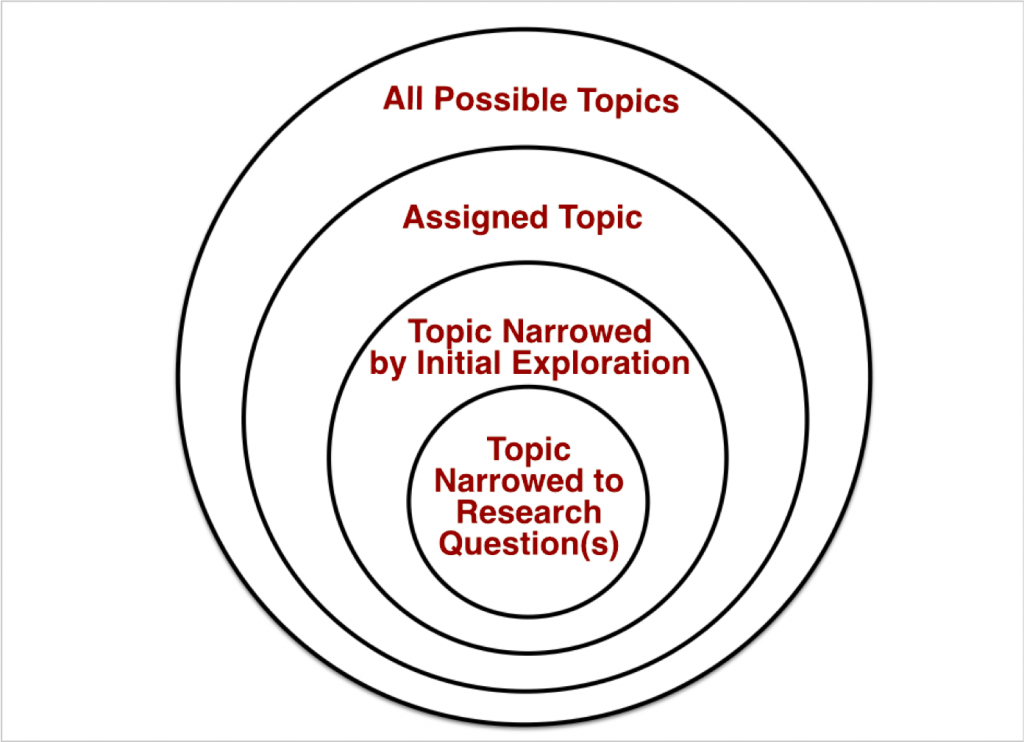
All Possible Topics -You’ll need to narrow your topic in order to do research effectively. Without specific areas of focus, it will be hard to even know where to begin.
Assigned Topics – When professors assign a topic you have to narrow, they have already started the narrowing process. Narrowing a topic means making some part of it more specific. Ideas about a narrower topic can come from anywhere. Often, a narrower topic boils down to deciding what’s interesting to you. One way to get ideas is to read background information from a source like Wikipedia.
Topic Narrowed by Initial Exploration – It’s wise to do some more reading about that narrower topic to a) learn more about it and b) learn specialized terms used by professionals and scholars who study it.
Topic Narrowed to Research Question(s) – A research question defines exactly what you are trying to find out. It will influence most of the steps you take to conduct the research.
ACTIVITY: Which Topic Is Narrower?
When we talk about narrowing a topic, we’re talking about making it more specific. You can make it more specific by singling out at least one part or aspect of the original to decrease the scope of the original. Now here’s some practice for you to test your understanding.
Why Narrow a Topic?
Once you have a need for research—say, an assignment—you may need to prowl around a bit online to explore the topic and figure out what you actually want to find out and write about.
For instance, maybe your assignment is to develop a poster about the season “spring” for an introductory horticulture course. The instructor expects you to narrow that topic to something you are interested in and that is related to your class.

Ideas about a narrower topic can come from anywhere. In this case, a narrower topic boils down to deciding what’s interesting to you about “spring” that is related to what you’re learning in your horticulture class and small enough to manage in the time you have.
One way to get ideas would be to read about spring in Wikipedia, looking for things that seem interesting and relevant to your class, and then letting one thing lead to another as you keep reading and thinking about likely possibilities that are more narrow than the enormous “spring” topic. (Be sure to pay attention to the references at the bottom of most Wikipedia pages and pursue any that look interesting. Your instructor is not likely to let you cite Wikipedia, but those references may be citable scholarly sources that you could eventually decide to use.)
Or, instead, if it is spring at the time you could start by just looking around, admire the blooming trees on campus, and decide you’d like your poster to be about bud development on your favorites, the crabapple trees.
What you’re actually doing to narrow your topic is making at least one aspect of your topic more specific. For instance, assume your topic is the maintenance of the 130 miles of sidewalks on OSU’s Columbus campus. If you made maintenance more specific, your narrower topic might be snow removal on Columbus OSU’s sidewalks. If instead, you made the 130 miles of sidewalks more specific, your narrower topic might be maintenance of the sidewalks on all sides of Mirror Lake.
Anna Narrows Her Topic and Works on a Research Question
The Situation: Anna, an undergraduate, has been assigned a research paper on Antarctica. Her professor expects students to (1) narrow the topic on something more specific about Antarctica because they won’t have time to cover that whole topic. Then they are to (2) come up with a research question that their paper will answer.
The professor explained that the research question should be something they are interested in answering and that it must be more complicated than what they could answer with a quick Google search. He also said that research questions often, but not always, start with either the word “how” or “why.”
What you should do:
- Read what Anna is thinking below as she tries to do the assignment.
- After the reading, answer the questions at the end of the monologue in your own mind.
- Check your answers with ours at the end of Anna’s interior monologue.
- Keep this demonstration in mind the next time you are in Anna’s spot, and you can mimic her actions and think about your own topic.
Anna’s Interior Monologue
Okay, I am going to have to write something—a research paper—about Antarctica. I don’t know anything about that place—I think it’s a continent. I can’t think of a single thing I’ve ever wanted to know about Antarctica. How will I come up with a research question about that place? Calls for Wikipedia, I guess.

At https://en.wikipedia.org/wiki/Antarctica . Just skimming. Pretty boring stuff. Oh, look– Antarctica’s a desert! I guess “desert” doesn’t have to do with heat. That’s interesting. What else could it have to do with? Maybe lack of precipitation? But there’s lots of snow and ice there. Have to think about that—what makes a desert a desert?
It says one to five thousand people live there in research stations. Year-round. Definitely, the last thing I’d ever do. “…there is no evidence that it was seen by humans until the 19th century.” I never thought about whether anybody lived in Antarctica first, before the scientists and stuff.
Lots of names—explorer, explorer… boring. It says Amundson reached the South Pole first. Who’s Amundson? But wait. It says, “One month later, the doomed Scott Expedition reached the pole.” Doomed? Doomed is always interesting. Where’s more about the Scott Expedition? I’m going to use that Control-F technique and type in Scott to see if I can find more about him on this page. Nothing beyond that one sentence shows up. Why would they have just that one sentence? I’ll have to click on the Scott Expedition link.

But it gives me a page called Terra Nova Expedition. What does that have to do with Scott? And just who was Scott? And why was his expedition doomed? There he is in a photo before going to Antarctica. Guess he was English. Other photos show him and his team in the snow. Oh, the expedition was named Terra Nova after the ship they sailed this time—in 1911. Scott had been there earlier on another ship.
Lots of stuff about preparing for the trip. Then stuff about expedition journeys once they were in Antarctica. Not very exciting—nothing about being doomed. I don’t want to write about this stuff.
Wait. The last paragraph of the first section says “For many years after his death, Scott’s status as a tragic hero was unchallenged,” but then it says that in the 20th-century people looked closer at the expedition’s management and at whether Scott and some of his team could be personally blamed for the catastrophe. That “remains controversial,” it says. Catastrophe? Personally blamed? Hmm.
Back to skimming. It all seems horrible to me. They actually planned to kill their ponies for meat, so when they actually did it, it was no surprise. Everything was extremely difficult. And then when they arrived at the South Pole, they found that the explorer Amundsen had beaten them. Must have been a big disappointment.
The homeward march was even worse. The weather got worse. The dog sleds that were supposed to meet them periodically with supplies didn’t show up. Or maybe the Scott group was lost and didn’t go to the right meeting places. Maybe that’s what that earlier statement meant about whether the decisions that were made were good ones. Scott’s diary said the crystallized snow made it seem like they were pushing and pulling the sledges through dry sand .

It says that before things turned really bad ( really bad? You’ve already had to eat your horses !), Scott allowed his men to put 30 pounds of rocks with fossils on the sledges they were pushing and dragging. Now was that sensible? The men had to push or pull those sledges themselves. What if it was those rocks that actually doomed those men?
But here it says that those rocks are the proof of continental drift. So how did they know those rocks were so important? Was that knowledge worth their lives? Could they have known?
Wow–there is drama on this page! Scott’s diary is quoted about their troubles on the expedition—the relentless cold, frostbite, and the deaths of their dogs. One entry tells of a guy on Scott’s team “now with hands as well as feet pretty well useless” voluntarily leaving the tent and walking to his death. The diary says that the team member’s last words were ”I am just going outside and may be some time.” Ha!
They all seem lost and desperate but still have those sledges. Why would you keep pulling and pushing those sledges containing an extra 30 pounds of rock when you are so desperate and every step is life or death?

Then there’s Scott’s last diary entry, on March 29, 1912. “… It seems a pity but I do not think I can write more.” Well.
That diary apparently gave lots of locations of where he thought they were but maybe they were lost. It says they ended up only 11 miles from one of their supply stations. I wonder if anybody knows how close they were to where Scott thought they were.
I’d love to see that diary. Wouldn’t that be cool? Online? I’ll Google it.
Yes! At the British museum. Look at that! I can see Scott’s last entry IN HIS OWN HANDWRITING!

Actually, if I decide to write about something that requires reading the diary, it would be easier to not have to decipher his handwriting. Wonder whether there is a typed version of it online somewhere?
Maybe I should pay attention to the early paragraph on the Terra Nova Expedition page in Wikipedia—about it being controversial whether Scott and his team made bad decisions so that they brought most of their troubles on themselves. Can I narrow my topic to just the controversy over whether bad decisions of Scott and his crew doomed them? Maybe it’s too big a topic if I consider the decisions of all team members. Maybe I should just consider Scott’s decisions.
So what research question could come from that? Maybe: how did Scott’s decisions contribute to his team’s deaths in Antarctica? But am I talking about his decisions before or after they left for Antarctica? Or the whole time they were a team? Probably too many decisions involved. More focused: How did Scott’s decisions after reaching the South Pole help or hurt the chances of his team getting back safely? That’s not bad—maybe. If people have written about that. There are several of his decisions discussed on the Wikipedia page, and I know there are sources at the bottom of that page.

Let me think—what else did I see that was interesting or puzzling about all this? I remember being surprised that Antarctica is a desert. So maybe I could make Antarctica as a desert my topic. My research question could be something like: Why is Antarctica considered a desert? But there has to be a definition of deserts somewhere online, so that doesn’t sound complicated enough. Once you know the definition of desert, you’d know the answer to the question. Professor Sanders says research questions are more complicated than regular questions.
What’s a topic I could care about? A question I really wonder about? Maybe those rocks with the fossils in them. It’s just so hard to imagine desperate explorers continuing to push those sledges with an extra 30 pounds of rocks on them. Did they somehow know how important they would be? Or were they just curious about them? Why didn’t they ditch them? Or maybe they just didn’t realize how close to death they were. Maybe I could narrow my Antarctica topic to those rocks.
Maybe my narrowed topic could be something like: The rocks that Scott and his crew found in Antarctica that prove continental drift. Maybe my research question could be: How did Scott’s explorers choose the rocks they kept?
Well, now all I have is questions about my questions. Like, is my professor going to think the question about the rocks is still about Antarctica? Or is it all about continental drift or geology or even the psychology of desperate people? And what has been written about the finding of those rocks? Will I be able to find enough sources? I’m also wondering whether my question about Scott’s decisions is too big—do I have enough time for it?

I think my professor is the only one who can tell me whether my question about the rocks has enough to do with Antarctica. Since he’s the one who will be grading my paper. But a librarian can help me figure out the other things.
So Dr. Sanders and a librarian are next.
Reflection Questions
- Was Anna’s choice to start with Wikipedia a good choice? Why or why not?
- Have you ever used that Control-F technique?
- At what points does Anna think about where to look for information?
- At the end of this session, Anna hasn’t yet settled on a research question. So what did she accomplish? What good was all this searching and thinking?
Our Answers:
- Was Anna’s choice to start with Wikipedia a good choice? Why or why not? Wikipedia is a great place to start a research project. Just make sure you move on from there, because it’s a not a good place to end up with your project. One place to move on to is the sources at the bottom of most Wikipedia pages.
- Have you ever used that Control-F technique? If you haven’t used the Control-F technique, we hope you will. It can save you a lot of time and effort reading online material.
- At what points does Anna think about where to look for information ? When she began; when she wanted to know more about the Scott expedition; when she wonders whether she could read Scott’s diary online; when she thinks about what people could answer her questions.
- At the end of this session, Anna hasn’t yet settled on a research question. So what did she accomplish? What good was all this reading and thinking? There are probably many answers to this question. Ours includes that Anna learned more about Antarctica, the subject of her research project. She focused her thinking (even if she doesn’t end up using the possible research questions she’s considering) and practiced critical thinking skills, such as when she thought about what she could be interested in, when she worked to make her potential research questions more specific, and when she figured out what questions still needed answering at the end. She also practiced her skills at making meaning from what she read, investigating a story that she didn’t expect to be there and didn’t know had the potential of being one that she is interested in. She also now knows what questions she needs answered and whom to ask. These thinking skills are what college is all about. Anna is way beyond where she was when she started.
Choosing & Using Sources: A Guide to Academic Research Copyright © 2015 by Teaching & Learning, Ohio State University Libraries is licensed under a Creative Commons Attribution 4.0 International License , except where otherwise noted.
Share This Book
How to Identify and Develop a Topic: .
How to identify and develop a topic.
It is difficult to define a topic with much specificity before starting your research. But until you define your topic, you won't know where to begin your search for information and you won't know what to look for. With a well-defined topic, you can focus your search strategies to find lots of relevant information without also finding a lot of useless stuff.
Selecting a topic to research is not a one-step task. Identifying and developing your topic is an ongoing process that does not end until you have finished your research project. Start with an idea you are interested in. Find and read some background information to get a better understanding of the topic, then use what you have learned to search for more specific information. Refine (broaden, narrow, refocus, or change) your topic, and try another search.
Find a Topic
If you weren't assigned a specific topic and can't think of one:
- talk with your class instructor (who is, after all, the reason you are doing this project in the first place)
- find something interesting in the course reading assignments
- look at the entries and index of a subject encyclopedia
- ask a librarian to help you figure out a topic
Narrow Your Topic
The initial idea for a research topic is often too broad. If your first searches for resources are so general that you find more information than you can click a mouse at or deal with in a reasonable amount of time (i.e. before the research project is due), focus on one of the following:
- a specific period of time
- a specific geographic location
- specific individuals or groups
- a specific aspect of the subject
- the viewpoint of a specific discipline
Make it a Question
It is often helpful to state your topic in the form of a question. Treat the research project as an attempt to find a specific answer for a specific question.
List Main Concepts
Pull out ideas and key terms that describe your topic. You can get a better idea of these by looking up your topic in an encyclopedia or other appropriate reference work. This will give you a better understanding of your topic, which will help you figure out what sources you will need and where you will need to look to find them.
Analyze Your Topic
Where should you look for information? From what subject or discipline perspective are you looking at this topic? Do you need scholarly or popular sources? Will you need books, articles, sound recordings, primary sources, etc.?
Select Appropriate Tools
Which tools do you need to find the type of information you want, (e.g. the library catalog for books, subject specific indexes for journal articles, etc.) See the library's guide to How to Find and Evaluate Sources for more.
Initial Results
After you do an initial search, you can tell some things just from the number and type of sources you find. If you get a million or so hits, you probably need to narrow your topic. If you get only a few, broaden it. If the hits seem to be irrelevant to your topic, search using different terms. Do another search and see if you get what seems to be an appropriate amount of appropriate sources. Keep refining your search until you are satisfied with your results. Then go read them.
After reading through some of the sources you find, you will get a better understanding of the topic you are researching. With this better understanding, you can revise your initial topic and its corresponding question for which you are so diligently seeking an answer. You can also refine your search strategy: the databases you search in, the keywords or subject terms you search for, etc. Go back and try another search using your revisions. Repeat as necessary until you have done enough research to know what to ask and how to answer it.
- Last Updated: Oct 20, 2020 8:13 PM
- URL: https://libguides.wesleyan.edu/topic
The Sheridan Libraries
- Writing Resources
- Sheridan Libraries
- Develop a Research Topic or Question
- How to Access Full Text
- Google Scholar and Google Books
- Evaluate Your Sources This link opens in a new window
- Citing Sources This link opens in a new window
- Avoiding Plagiarism
- Books to Help You Write
- Copyright This link opens in a new window
- How To Read an Article
- Literature Reviews
- RefWorks Guide and Help This link opens in a new window
- Other Guides to Help You
Before You Start
- What do you already know about your subject? Keep a list of key words, names, and events.
- How long has your subject existed? Is it a relatively new concept with a lot published about it, or new and undiscovered?
- What discipline does your topic fall into? A discipline is an area of study or branch of learning (e.g., History, Biology). Each has its own best starting points.
- How are you viewing the topic? Think about what you are planning to emphasize: politics, history, or another aspect?
- What's the Timing? How long do you have to do this project? How long does it need to be?
Three Approaches for Developing a Topic
Approach #1: List Key Words of Interest Make lists of concepts and topics you find interesting, as well as lists of related words and synonyms. These can serve as your key search terms.
Approach #2: Draw It Out Sketch out the relationships between ideas.
Approach #3: Define it in Sentences Write an explanation of your topic, justifying it on multiple levels:
I am studying... conformity in Woolf’s Orlando in order to find out... how Orlando’s efforts to conform and fit in change over time in order to help my reader understand... the role maturity and self-awareness play in the character’s efforts to conform to societal norms.
Adapted from The Craft of Research (2003) by Wayne C. Booth, Gregory G. Colomb, and Joseph M. Williams. (We also own the latest edition, 8th edition, 2016 , in print.)
- << Previous: HOME - The Research Process
- Next: How to Access Full Text >>
- Last Updated: May 13, 2024 10:04 AM
- URL: https://guides.library.jhu.edu/writing

Research Topics: How to Select & Develop: Refining a Research Topic
- Understanding the Assignment
- Choosing a Research Topic
- Refining a Research Topic
- Developing a Research Question
- Deciding What Types of Sources You Will Need
- Research Help
Ask a Librarian
Chat with a Librarian
Lisle: (630) 829-6057 Mesa: (480) 878-7514 Toll Free: (877) 575-6050 Email: [email protected]
Book a Research Consultation Library Hours

Research is a dynamic process. Be prepared to modify or refine your topic. This is usually the sign of thoughtful and well-done research. Usually researchers start out with a broad topic before narrowing it down. These strategies can help with that process.
Brainstorm Concepts
Think of words or concepts that relate to that topic. For example, if your topic is "polar bears," associated words might include: ice, cubs, pollution, hunting, diet, and environmental icon.
Make a Concept Map
Create a visual map your topic that shows different aspects of the topic. Think about questions related to your topic. Consider the who, what, where, when, and why (the 5 W's).
For example, when researching the local food culture, you might consider:
- Why do people buy local?
- What specific food items are people more likely to buy local and why?
- What are the economic aspects of buying local? Is it cheaper?
- Do people in all socio-economic strata have access to local food?
This short video explains how to make a concept map:
Source: Douglas College Library
You can make a concept map by hand or digitally. Below is a link to a free online concept mapping tool:
- Bubbl.us Free tool for building concept maps.
Consider Your Approach or Angle
Your research could, for example, use a historical angle (focusing on a particular time period); a geographical angle (focusing on a particular part of the world); or a sociological angle (focusing on a particular group of people). The angle you choose will depend largely on the nature of your research question and often on the class or the academic discipline in which you are working.
Conduct Background Research
Finding background information on your topic can also help you to refine your topic. Background research serves many purposes.
- If you are unfamiliar with the topic, it provides a good overview of the subject matter.
- It helps you to identify important facts related to your topic: terminology, dates, events, history, and names or organizations.
- It can help you to refine your topic.
- It might lead you to bibliographies that you can use to find additional sources of information on your topic.
Reference sources like the ones listed below can help you find an angle on your topic and identify an interesting research question. If you are focusing on a particular academic discipline, you might do background reading in subject-specific encyclopedias and reference sources. Background information can also be found in:
- dictionaries
- general encyclopedias
- subject-specific encyclopedias
- article databases
These sources are often listed in our Library Research Guides .
Here are some resources you may find helpful in finding a strong topic:
- I-Share Use I-Share to search for library materials at more than 80 libraries in Illinois and place requests.
- Wikipedia Get a quick overview of your topic. (Of course, evaluate these articles carefully, since anyone can change them). An entry's table of contents can help you identify possible research angles; the external links and references can help you locate other relevant sources. Usually you won't use Wikipedia in your final paper, because it's not an authoritative source.
- Gale Virtual Reference Library Reference eBooks on a variety of topics, including business, history, literature, medicine, social science, technology, and many more.
- Oxford Reference Reference eBooks on a handful of topics, including management, history, and religion.
Conduct Exploratory In-Depth Research
Start doing some exploratory, in-depth research. As you look for relevant sources, such as scholarly articles and books, refine your topic based on what you find. While examining sources, consider how others discuss the topic. How might the sources inform or challenge your approach to your research question?
- Choosing and Refining Topics Tutorial A detailed tutorial from Colorado State University
- << Previous: Choosing a Research Topic
- Next: Developing a Research Question >>
- Last Updated: Jan 4, 2024 9:55 AM
- URL: https://researchguides.ben.edu/topics
Kindlon Hall 5700 College Rd. Lisle, IL 60532 (630) 829-6050
Gillett Hall 225 E. Main St. Mesa, AZ 85201 (480) 878-7514
Want to create or adapt books like this? Learn more about how Pressbooks supports open publishing practices.
Narrowing a Topic
For many students, having to start with a research question is the biggest difference between how they did research in high school and how they are required to carry out their college research projects. It’s a process of working from the outside in: you start with the world of all possible topics (or your assigned topic) and narrow down until you’ve focused your interest enough to be able to tell precisely what you want to find out, instead of only what you want to “write about.”
Process of Narrowing a Topic

Visualize narrowing a topic as starting with all possible topics and choosing narrower and narrower subsets until you have a specific enough topic to form a research question.
All Possible Topics – You’ll need to narrow your topic to do research effectively. Without specific areas of focus, it will be hard to even know where to begin.
Assigned Topics – Ideas about a narrower topic can come from anywhere. Often, a narrower topic boils down to deciding what’s interesting to you. One way to get ideas is to read background information in a source like Wikipedia.
Topic Narrowed by Initial Exploration – It’s wise to do some background reading about that narrower topic to a) learn more about it and b) learn specialized terms used by professionals and scholars who study it.
Topic Narrowed to Research Question(s) – A research question defines exactly what you are trying to find out. It will influence most of the steps you take to conduct the research.
Why Narrow a Topic?
Once you have a need for research—say, an assignment—you may need to prowl around a bit online to explore the topic and figure out what you actually want to find out and write about. For instance, maybe your assignment is to develop a poster about “spring” for an introductory horticulture course. The instructor expects you to narrow that topic to something you are interested in and that is related to your class.

Another way to view a narrowed topic is as a sliver of the whole topic.
Ideas about a narrower topic can come from anywhere. In this case, a narrower topic boils down to deciding what’s interesting to you about “spring” that is related to what you’re learning in your horticulture class and small enough to manage in the time you have. One way to get ideas would be to read about spring in Wikipedia, a reference database such as CREDO, or a subject encyclopedia. Look for things that seem interesting and relevant to your class, and then let one thing lead to another as you keep reading and thinking about likely possibilities that are more narrow than the enormous “spring” topic. Be sure to pay attention to the references at the bottom of most Wikipedia pages and pursue any that look interesting. Your instructor is not likely to let you cite Wikipedia, but those references may be scholarly sources that you could eventually decide to use and cite.
Or, instead, if it is spring at the time you could start by just looking around, admire the blooming trees on campus, and decide you’d like your poster to be about bud development on your favorites, the crabapple trees.
Jada Narrows Her Topic and Works on a Research Question
The Situation: Jada, an undergraduate, has been assigned a research paper on Antarctica. Her professor expects students to narrow the topic to something more specific about Antarctica because they won’t have time to cover that whole topic. Then they are to come up with a research question that their paper will answer.
The professor explained that the research question should be something they are interested in answering and that it must be more complicated than what they could answer with a quick Google search. She also said that research questions often start with either the word “how” or “why.”
Try it out:
- Read what Jada is thinking below as she tries to do the assignment.
- After the reading, answer the questions based on your own approach to research.
- Check your answers with ours.
- Keep this passage in mind the next time you start a research topic and mimic the process that Jada uses.

Jada’s Thoughts
Okay, I have to write—a research paper—about Antarctica. I don’t know anything about that place—and I can’t think of a single thing I’d like to know about Antarctica. Calls for Wikipedia, I guess.
Guess I’ll go here https://en.wikipedia.org/wiki/Antarctica . Just skimming. Pretty boring stuff. Oh, look– Antarctica’s a desert! I guess “desert” doesn’t have to do with heat. That’s interesting. Why is it considered a desert, there’s lots of snow and ice there. Have to think about that—what makes a desert a desert.
It says one to five thousand people live there in research stations. Year-round. And there is no evidence that it was seen by humans until the 19th century. I never thought about whether anybody lived in Antarctica first, before explorers and scientists.
Lots of names—explorers, others. It says Amundsen reached the South pole first. Who’s Amundsen? But wait. It says, “One month later, the doomed Scott Expedition reached the pole.” Doomed? Doomed is always interesting. Where is there more information about the Scott Expedition? There is only one sentence. Why would they have just that one sentence? I’ll have to click on the Scott Expedition link.
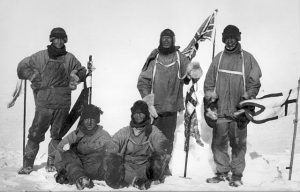
Terra Nova…
But it gives me a page called Terra Nova Expedition. What does that have to do with Scott? Who was he and why was his expedition doomed? There he is in a photo before going to Antarctica. Guess he was English. Other photos show him and his team in the snow. Oh, the expedition was named Terra Nova after the ship they sailed this time—in 1911. Scott was also there earlier on another ship.
Lots of info about preparing for the trip. Then stuff about expedition journeys once they were in Antarctica. Not very exciting—nothing about being doomed.
Wait. The last paragraph of the first section says “For many years after his death, Scott’s status as a tragic hero was unchallenged,” but then it says that in the 20th-century people looked closer at the expedition’s management and at whether Scott and some of his team could be personally blamed for the catastrophe. That “remains controversial,” it says. Catastrophe? Personally, blamed? Hmm.
Back to skimming. It all seems horrible to me. They actually planned to kill their ponies for meat. Everything was extremely difficult. And then when they arrived at the South Pole, they found that the explorer Amundsen had beaten them. Must have been a big disappointment.
The homeward march was even worse. The weather was bad. The dog sleds that were supposed to meet them periodically with supplies didn’t show up. Or maybe the Scott group was lost and didn’t go to the right meeting places. Maybe that’s what that earlier statement meant about whether the decisions that were made were good ones. Scott’s diary said the crystallized snow made it seem like they were pushing and pulling the sleds through dry sand .

It says that before things turned really bad, Scott allowed his men to put 30 pounds of rocks with fossils on the sleds they were pushing and dragging. Now was that sensible? But here it says that those rocks are the proof of continental drift. So how did they know those rocks were so important? Was that knowledge worth their lives? Could they have known?
Scott’s diary is quoted about their troubles on the expedition—the relentless cold, frostbite, and the deaths of their dogs. One entry tells of a guy on Scott’s team “now with hands as well as feet pretty well useless” voluntarily leaving the tent and walking to his death. The diary says that the team member’s last words were ”I am just going outside and may be some time.”
They all seem lost and desperate but still have those sleds. Why would you keep pulling and pushing those sleds containing an extra 30 pounds of rock when you are so desperate and every step is life or death?
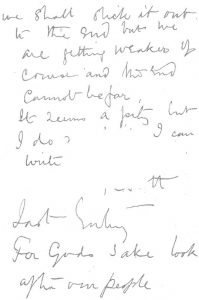
Then there’s Scott’s last diary entry, on March 29, 1912. “… It seems a pity but I do not think I can write more.”. The diary apparently gave lots of locations of where he thought they were but maybe they were lost. It says they ended up only 11 miles from one of their supply stations.
I’d love to see that diary. Wouldn’t that be cool? Online? I’ll Google it. Yes! it’s at the British Museum. Look at that! I can see Scott’s last entry IN HIS OWN HANDWRITING! And there’s a digital copy too.
I wonder if I should narrow my topic to just the controversy over whether the expedition was doomed because of the bad decisions made by Scott and his crew? Maybe it’s too big a topic if I consider the decisions of all team members. Maybe I should just consider Scott’s decisions. They should be noted in the diary.
So what research question could come from that? Maybe: how did Scott’s decisions contribute to his team’s deaths in Antarctica? Need to be more focused: How did Scott’s decisions after reaching the South Pole help or hurt the chances of his team getting back safely? There are several of his decisions discussed on the Wikipedia page, and I know there are sources at the bottom of that page.
Really, a desert?
Let me think—what else did I see that was interesting or puzzling about all this? I remember being surprised that Antarctica is a desert. So maybe I could make the desert of Antarctica my topic. My research question could be something like: Why is Antarctica considered a desert? But there has to be a definition of deserts somewhere online, so that doesn’t sound complicated enough. Maybe those rocks with the fossils in them. It’s just so hard to imagine desperate explorers continuing to push those sleds with an extra 30 pounds of rocks on them. Did they somehow know how important they would be? Why didn’t they ditch them? Or maybe they just didn’t realize how close to death they were. Maybe I could narrow my Antarctica topic to those rocks.
Maybe my topic could be something like The rocks that Scott and his crew found in Antarctica that prove continental drift. Maybe my research question could be: How did Scott’s explorers choose the rocks they kept? Or maybe I should stick with why Scott and his crew made bad decisions.

I should ask.
I think my professor is the only one who can tell me whether my question about the rocks has enough to do with Antarctica. Since she’s the one who will be grading my paper. But a librarian can help me figure out the other things. So Dr. Sanders and a librarian are next.
- Was Jada’s choice to start with Wikipedia a good choice? Why or why not?
- Have you ever skimmed resources first and then read more deeply later?
- At what points does Jada think about where to look for information?
- At the end of this session, Jada hasn’t yet settled on a research question. So what did she accomplish? What good was all this searching and thinking?
Our Answers
- Was Jada’s choice to start with Wikipedia a good choice? Although not usually cited in research papers, Wikipedia is a good place to learn more about all kinds of topics. Information is usually general in nature and you can check out the references at the bottom of the page. Use those links to find additional resources. This may lead you to library based sources like subject dictionaries, encyclopedias, or guides.
- Have you ever skimmed resources first and then read more deeply later? When first exploring your topic you may choose to skim resources. That is a very brief read looking for interesting and useful information. Later when you select a topic and look for resources that provide deeper, more focused information.
- At what points does Jada think about where to look for information? After receiving the core part of the topic (Antarctica), she begins looking for general information and becomes curious about the Scott expedition. As she learns more she thinks about where she can look for additional information, such as the diary mentioned in Wikipedia..
- At the end of this session, Jada hasn’t yet settled on a research question. So what did she accomplish? What good was all this searching and thinking? The background information that Jada looked at helped her to focus on the problems with the Scott Expedition. She slowly narrows down some of the issues and centers on the weight of the rocks. She considers two different questions (one more narrow than the other) and intends to seek input from the professor and librarian. Taking the time to explore her topic has given her ideas useful for a solid research question.
Exercise: Determine the Topic Order
Critical Thinking in Academic Research Copyright © 2022 by Cindy Gruwell and Robin Ewing is licensed under a Creative Commons Attribution-ShareAlike 4.0 International License , except where otherwise noted.
Share This Book
Selecting a Research Topic: Refine your topic
- Refine your topic
- Background information & facts
Narrow your topic's scope
Too much information? Make your results list more manageable. Less, but more relevant, information is key. Here are some options to consider when narrowing the scope of your paper:
- Theoretical approach : Limit your topic to a particular approach to the issue. For example, if your topic concerns cloning, examine the theories surrounding of the high rate of failures in animal cloning.
- Aspect or sub-area : Consider only one piece of the subject. For example, if your topic is human cloning, investigate government regulation of cloning.
- Time : Limit the time span you examine. For example, on a topic in genetics, contrast public attitudes in the 1950's versus the 1990's.
- Population group : Limit by age, sex, race, occupation, species or ethnic group. For example, on a topic in genetics, examine specific traits as they affect women over 40 years of age.
- Geographical location : A geographic analysis can provide a useful means to examine an issue. For example, if your topic concerns cloning, investigate cloning practices in Europe or the Middle East.
Broaden your topic
Not finding enough information? Think of related ideas, or read some background information first. You may not be finding enough information for several reasons, including:
- Your topic is too specific . Generalize what you are looking for. For example: if your topic is genetic diversity for a specific ethnic group in Ghana, Africa, broaden your topic by generalizing to all ethnic groups in Ghana or in West Africa.
- Your topic is too new for anything substantive to have been written. If you're researching a recently breaking news event, you are likely to only find information about it in the news media. Be sure to search databases that contain articles from newspapers. If you are not finding enough in the news media, consider changing your topic to one that has been covered more extensively.
- You have not checked enough databases for information . Search Our Collections to find other databases in your subject area which might cover the topic from a different perspective. Also, use excellent searching techniques to ensure you are getting the most out of every database.
- You are using less common words or too much jargon to describe your topic. Use a thesaurus to find other terms to represent your topic. When reading background information, note how your topic is expressed in these materials. When you find citations in an article database, see how the topic is expressed by experts in the field.
Once you have a solid topic, formulate your research question or hypothesis and begin finding information.
If you need guidance with topic formulation, Ask Us ! Library staff are happy to help you focus your ideas.
- << Previous: Overview
- Next: Background information & facts >>
- Last Updated: Jul 30, 2021 2:50 PM
- URL: https://libguides.mit.edu/select-topic

Research Tips and Tricks
- Getting Started
- Understanding the Assignment
- Topic Selection Tips
Topic Narrowing
Ways to narrow your topic, be careful, tools to help, youtube videos about narrowing a topic.
- Breaking Topic Into Keywords
- Developing A Search Strategy
- Scholarly vs Popular Sources
- What Are Primary Sources?
- Finding Scholarly Articles
- Finding Scholarly Books
- Finding Primary Sources
- Citing My Sources This link opens in a new window
Instructional Librarian

Talk to your professor
A common challenge when beginning to write a research paper is determining how to narrow down your topic.
Even if your professor gives you a topic to study, it will seldom be specific enough that you will not have to narrow it down, at least to some degree.
A topic is too broad to be manageable when you find that you have too many different, conflicting or only remotely related ideas.
Although you will want to start the writing process by considering a variety of different approaches to studying the research problem, you will need to narrow the focus of your investigation at some point early in the writing process - this way you don't attempt to do too much in one paper.
Here are some strategies to help narrow your topic :
Aspect -- choose one lens through which to view the research problem, or look at just one facet of it.
- e.g., rather than studying the role of food in South Asian religious rituals, explore the role of food in Hindu ceremonies or the role of one particular type of food among several religions.
Components -- determine if your initial variable or unit of analysis can be broken into smaller parts, which can then be analyzed more precisely.
- e.g., a study of tobacco use among adolescents can focus on just chewing tobacco rather than all forms of usage or, rather than adolescents in general, focus on female adolescents in a specific age range who choose to use tobacco.
Methodology -- how you gather information can reduce the domain of interpretive analysis needed to address the research problem.
- e.g., a single case study can be designed to generate data that does not require as extensive an explanation as using multiple cases.
Place -- generally, the smaller the geographic unit of analysis, the more narrow the focus.
- e.g., rather than study trade relations in North America, study trade relations between Mexico and the United States.
Relationship -- ask yourself how do two or more different perspectives or variables relate to one another. Designing a study around the relationships between specific variables can help constrict the scope of analysis.
- e.g., cause/effect, compare/contrast, contemporary/historical, group/individual, male/female, opinion/reason, problem/solution.
Time -- the shorter the time period of the study, the more narrow the focus.
- e.g., study of relations between Russia and the United States during the Vietnam War.
Type -- focus your topic in terms of a specific type or class of people, places, or phenomena.
- e.g., a study of developing safer traffic patterns near schools can focus on SUVs, or just student drivers, or just the timing of traffic signals in the area.
Cause -- focus your topic to just one cause for your topic.
- e.g., rather than writing about all the causes of WW1, just write about nationalism.

When narrowing your topic, make sure you don't narrow it too much. A topic is too narrow if you can state it in just a few words.
For example:
- How many soldiers died during the first world war?
- Who was the first President of the United States?
- Why is ocean water salty?
- Why are Pringles shaped the way they are?
- Developing a Research Topic This exercise is designed to help you develop a thoughtful topic for your research assignment, including methods for narrowing your topic.
- What Makes a Good Research Question?
- Narrowing Your topic
- Four Steps To Narrow Your Research Topic
- << Previous: Topic Selection Tips
- Next: Breaking Topic Into Keywords >>
- Last Updated: Apr 9, 2024 10:45 AM
- URL: https://kingsu.libguides.com/research
- PRO Courses Guides New Tech Help Pro Expert Videos About wikiHow Pro Upgrade Sign In
- EDIT Edit this Article
- EXPLORE Tech Help Pro About Us Random Article Quizzes Request a New Article Community Dashboard This Or That Game Popular Categories Arts and Entertainment Artwork Books Movies Computers and Electronics Computers Phone Skills Technology Hacks Health Men's Health Mental Health Women's Health Relationships Dating Love Relationship Issues Hobbies and Crafts Crafts Drawing Games Education & Communication Communication Skills Personal Development Studying Personal Care and Style Fashion Hair Care Personal Hygiene Youth Personal Care School Stuff Dating All Categories Arts and Entertainment Finance and Business Home and Garden Relationship Quizzes Cars & Other Vehicles Food and Entertaining Personal Care and Style Sports and Fitness Computers and Electronics Health Pets and Animals Travel Education & Communication Hobbies and Crafts Philosophy and Religion Work World Family Life Holidays and Traditions Relationships Youth
- Browse Articles
- Learn Something New
- Quizzes Hot
- This Or That Game
- Train Your Brain
- Explore More
- Support wikiHow
- About wikiHow
- Log in / Sign up
- Education and Communications
- College University and Postgraduate
- Academic Writing
- Research Papers
How to Establish a Research Topic: Easy Writing Tips
Last Updated: December 15, 2022 Fact Checked
This article was co-authored by Alexander Ruiz, M.Ed. . Alexander Ruiz is an Educational Consultant and the Educational Director of Link Educational Institute, a tutoring business based in Claremont, California that provides customizable educational plans, subject and test prep tutoring, and college application consulting. With over a decade and a half of experience in the education industry, Alexander coaches students to increase their self-awareness and emotional intelligence while achieving skills and the goal of achieving skills and higher education. He holds a BA in Psychology from Florida International University and an MA in Education from Georgia Southern University. There are 9 references cited in this article, which can be found at the bottom of the page. This article has been fact-checked, ensuring the accuracy of any cited facts and confirming the authority of its sources. This article has been viewed 110,776 times.
With a world of possibilities out there, choosing a research topic can be a daunting task. However, selecting a worthy subject is half the battle when it comes to producing valuable original research. If you take some time to attentively brainstorm possibilities and refine them down into a solid, focused research question, you’ll come away with a topic that’s manageable, worthwhile, and, most importantly, interesting to you.
Picking a Topic

- One way to ensure you have a topic that’s of interest to you to pick a subject to which you have a personal connection. For instance, if your sister has Crohn's Disease, you may be interested in investigating it. Or, if you went on an exchange program to Croatia, you might be keen to know more about its history or culture.
- Another way to trim down your possibilities is to see if there any patterns that emerge from the longer list. For example, if you wrote down “Gertrude Stein” and “Djuna Barnes,” you could focus on lesbian expat authors.

- You want to choose a topic that has some, but not too much information available on it. If there are some substantive related resources out there, you know you’re on the right track; if there are pages and pages of relevant search results, you can tell that plenty of people have already gone down that road or that the topic is likely too big to cover and you will need to narrow it further.

- For instance, if you are interested in the mapping of the human genome, read about the general history of the scientific advances that have allowed us to map DNA and see if there’s a particular subtopic that catches your eye. Instead of trying to cover the entire subject, limit your scope to focus on the discovery of a gene related to a specific trait or disease or on a particular application, like the regulation of gene therapy for unborn fetuses.
Kim Gillingham, MA
Use your interests to narrow your focus. Retired librarian, Kim Gillingham, adds: "You can start with a general topic such as Outer Space. Then ask yourself specific questions such as 'What am I interested in about Outer Space?' It could be the history of space exploration, the technology of space exploration, or 'Is Pluto a planet or not?' As always, librarians can be of immense help in narrowing down a topic through a technique called the Reference Interview — try asking your librarian about it!"

- When you meet with or email them, explain the research that you’ve already conducted to show them that you’ve done your homework. Then, ask something like, “I’m most interested in looking into coming of age rituals in contemporary indigenous cultures, and I was wondering if you think that’s a good topic to pursue and if you had any suggestions for specific case studies or other resources related to it.”
- Remember: they may be able to point you in a more specific direction based on your general interests, but don’t expect them to do the whole selection process for you.
- If you’re doing independent research to earn a degree (rather than to fulfill the requirements of a particular class), you should also ask them about the potential marketability of your subject since your topic will be setting the direction for your future career.
Developing Your Research Question

- After you conduct your preliminary research, think about the gaps that you noticed in the information available on the subject that you’ve been investigating. Devise a question that could address that missing information.
- One concrete way to do this is to explore the relationship between two ideas, concepts, phenomena, or events that came up in your research but whose relationship has not been fully investigated. For example, “how did political radicals influence popular representations of sexuality in the 1920s United States?”
- Another concrete way to formulate your question is to consider how an existing methodology or concept applies to a new, specific context or case study. For instance, you could think of how Sigmund Freud’s idea of the “appendage” applies to a specific virtual reality game.

- For example, if your question requires conducting a study that’s not feasible given your timeframe or the resources available to you, then you need to find a way to revise your question so that you can answer it.
- Sometimes if your topic is too new, there won’t be a substantial enough body of research available for you to do a comprehensive analysis of it. In that case, you may need to revise or broaden your question so that you can actually answer it. [5] X Research source

- If your question is not narrow enough, refine your focus further by limiting your topic according to a given historical era, theoretical approach, geographical region, demographic or culture, industry or field. For example, if you’re interested in refugees, you might limit your scope by honing in on a particular event (World War II) and/or time period (the 1940s), a specific location (England) and/or population (Jewish people from Austria). [6] X Research source


Making Sure that You’re on the Right Track

- You might have a brilliant research question, but, if it’s about genetic disorders and the grant you’re applying for only funds research on communicable diseases, you’ll need to go back to the drawing board.
- Also be sure to take the required length of the project into consideration. For instance, if your question is too narrow or specific, you might not be able to hit the 250-page requirement for a doctoral thesis.

- Start by listing the various research methods that you’ll use, such as a literature review, interviews, and qualitative analysis. Then, create a timeline for when you’ll be doing each kind of research, being sure to leave enough time for yourself to complete the writing.
- You can order topics chronologically (for instance, if you’re studying a historical event). Most often, you’ll order them according to the progression of your argument, with one idea building on the last.
- Your research may change the structure or content of your outline, but it’s still useful to have a well-developed starting point.

Community Q&A
- If you have no idea of where to begin, consider going through old notes and textbooks or speaking to classmates to get some inspiration. Or, browse through the most recently published journals in your field to see what the latest trends in research are. Thanks Helpful 1 Not Helpful 0

- Since research is a demanding process, the most important thing is that you choose a topic that will sustain your enthusiasm and curiosity. Thanks Helpful 5 Not Helpful 1
You Might Also Like

- ↑ https://writingcenter.unc.edu/tips-and-tools/brainstorming/
- ↑ http://libguides.mit.edu/select-topic
- ↑ https://bowvalleycollege.libguides.com/research-help/topics
- ↑ https://libraries.indiana.edu/sites/default/files/Develop_a_Research_Question.pdf
- ↑ http://libguides.mit.edu/c.php?g=175961&p=1160160#s-lg-box-wrapper-4114979
- ↑ http://libguides.mit.edu/c.php?g=175961&p=1160160#791450
- ↑ https://files.bucknell.edu/Documents/ISR/topic.pdf
- ↑ Alexander Ruiz, M.Ed.. Educational Consultant. Expert Interview. 18 June 2020.
- ↑ http://libguides.usc.edu/writingguide/outline
About This Article

- Send fan mail to authors
Reader Success Stories
Aelita Zholchieva
Apr 7, 2020
Did this article help you?
Priya Mariyappan
Feb 2, 2017
Sep 29, 2017

Featured Articles

Trending Articles

Watch Articles

- Terms of Use
- Privacy Policy
- Do Not Sell or Share My Info
- Not Selling Info
wikiHow Tech Help Pro:
Develop the tech skills you need for work and life

TODAY'S HOURS:
Research Process
Selecting a topic, brainstorming for a topic.
- Find Background Info
- Focus Topic
- List Keywords
- Search for Sources
- Evaluate & Integrate Sources
- Cite and Track Sources
- Scientific Research & Study Design
Related Guides
- Research Topic Ideas by Liz Svoboda Last Updated Mar 1, 2024 147402 views this year
- Identifying Information Sources by Liz Svoboda Last Updated Mar 13, 2024 2502 views this year
- Understanding Journals: Peer-Reviewed, Scholarly, & Popular by Liz Svoboda Last Updated Jan 10, 2024 1557 views this year
Have a Question? Need Some Help?
Email: [email protected] Phone: (810) 762-3400 Text message: (810) 407-5434 (text messages only)
The ability to develop a good research topic is an important skill. An instructor may assign you a specific topic, but most often instructors require you to select your own topic of interest. When deciding on a topic, there are a few things that you will need to do:
- Brainstorm for ideas.
- Choose a topic that will enable you to read and understand the articles and books you find.
- Ensure that the topic is manageable and that material is available.
- Make a list of key words.
- Be flexible. You may have to broaden or narrow your topic to fit your assignment or the sources you find.
Selecting a good topic may not be easy. It must be narrow and focused enough to be interesting, yet broad enough to find adequate information. Before selecting your final topic, make sure you know what your final project should look like. Each class or instructor will likely require a different format or style of research project.
Choose a topic that interests you. Use the following questions to help generate topic ideas.
- Do you have a strong opinion on a current social or political controversy?
- Did you read or see a news story recently that has piqued your interest or made you angry or anxious?
- Do you have a personal issue, problem, or interest that you would like to know more about?
- Is there an aspect of a class that you are interested in learning more about?
Write down any key words or concepts that may be of interest to you. These terms can be helpful in your searching and used to form a more focused research topic.
Be aware of overused ideas when deciding a topic. You may wish to avoid topics such as abortion, gun control, teen pregnancy, or suicide unless you feel you have a unique approach to the topic. Ask the instructor for ideas if you feel you are stuck or need additional guidance.
If you need help, try our Research Topic Guide for ideas.
Sometimes using a Concept Map can help you come up with directions to take your research.
- Topic Concept Map Download and print this PDF to create a concept map for your topic. Put your main topic in the middle circle and then put ideas related to your topic on the lines radiating from the circle.
- << Previous: Overview
- Next: Find Background Info >>
- Last Updated: May 21, 2024 1:45 PM
- URL: https://libguides.umflint.edu/research

- Customer Reviews
- Extended Essays
- IB Internal Assessment
- Theory of Knowledge
- Literature Review
- Dissertations
- Essay Writing
- Research Writing
- Assignment Help
- Capstone Projects
- College Application
- Online Class
How to Select a Research Topic: A Step-by-Step Guide (2021)
by Antony W
September 15, 2021

Learning how to select a research topic can be the difference between failing your assignment and writing a comprehensive research paper. That’s why in this guide we’ll teach you how to select a research topic step-by-step.
You don’t need this guide if your professor has already given you a list of topics to consider for your assignment . You can skip to our guide on how to write a research paper .
If they have left it up to you to choose a topic to investigate, which they must approve before you start working on your research study, we suggest that you read the process shared in this post.
Choosing a topic after finding your research problem is important because:
- The topic guides your research and gives you a mean to not only arrive at other interesting topics but also direct you to discover new knowledge
- The topic you choose will govern what you say and ensures you keep a logical flow of information.
Picking a topic for a research paper can be challenging and sometimes intimidating, but it’s not impossible. In the following section, we show you how to choose the best research topic that your instructor can approve after the first review.
How to Select a Research Topic
Below are four steps to follow to find the most suitable topic for your research paper assignment:
Step 1: Consider a Topic that Interests You

If your professor has asked you to choose a topic for your research paper, it means you can choose just about any subject to focus on in your area of study. A significant first step to take is to consider topics that interest you.
An interesting topic should meet two very important conditions.
First, it should be concise. The topic you choose should not be too broad or two narrow. Rather, it should be something focused on a specific issue. Second, the topic should allow you to find enough sources to cite in the research stage of your assignment.
The best way to determine if the research topic is interesting is to do some free writing for about 10 minutes. As you free write, think about the number of questions that people ask about the topic and try to consider why they’re important. These questions are important because they will make the research stage easier for you.
You’ll probably have a long list of interesting topics to consider for your research assignment. That’s a good first step because it means your options aren’t limited. However, you need to narrow down to only one topic for the assignment, so it’s time to start brainstorming.
Step 2: Brainstorm Your Topics
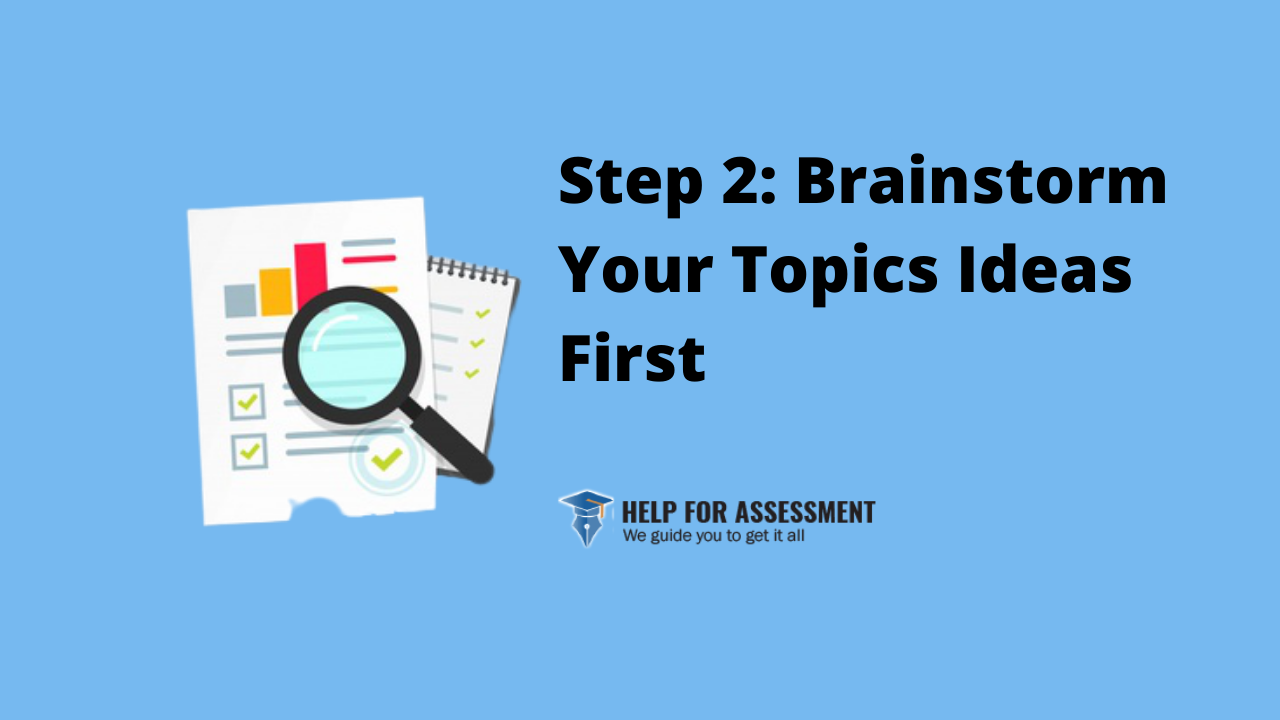
You aren’t doing research at this stage yet. You are only trying to make considerations to determine which topic will suit your research assignment.
The brainstorming stage isn’t difficult at all. It should take only a couple of hours or a few days depending on how you approach.
We recommend talking to your professor, classmates, and friends about the topics that you’ve picked and ask for their opinion. Expect mixed opinions from this audience and then consider the topics that make the most sense. Note what topics picked their interest the most and put them on top of the list.
You’ll end up removing some topics from your initial list after brainstorming, and that’s completely fine. The goal here is to end up with a topic that interests you as well as your readers.
Step 3: Define Your Topics
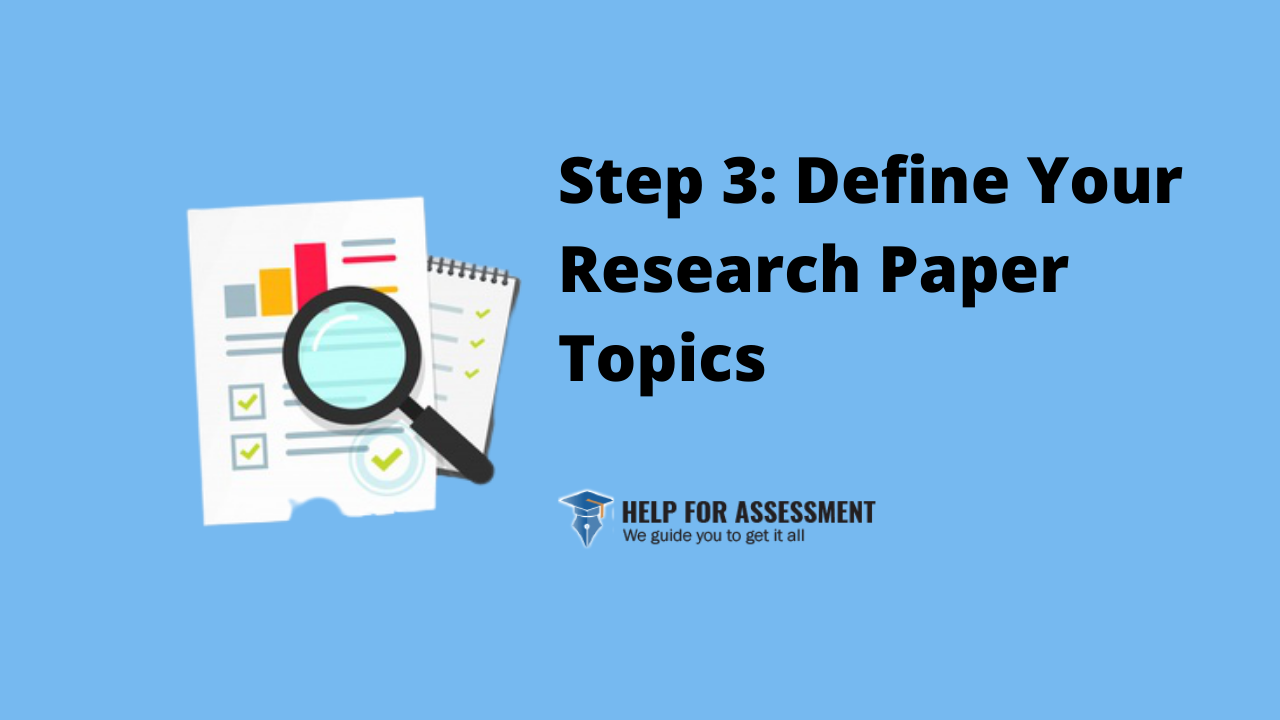
Check once again to make sure that your topic is a subject that you can easily define. You want to make sure the topic isn’t too broad or too narrow.
Often, a broad topic presents overwhelming amount of information, which makes it difficult to write a comprehensive research paper. A narrow topic, on the other hand, means you’ll find very little information, and therefore it can be difficult to do your assignment.
The length of the research paper, as stated in the assignment brief, should guide your topic selection.
Narrow down your list to topics that are:
- Broad enough to allows you to find enough scholarly articles and journals for reference
- Narrow enough to fit within the expected word count and the scope of the research
Topics that meet these two conditions should be easy to work on as they easily fit within the constraints of the research assignment.
Step 4: Read Background Information of Selected Topics

You probably have two or three topics by the time you get to this step. Now it’s time to read the background information on the topics to decide which topic to work on.
This step is important because it gives you a clear overview of the topic, enabling you to see how it relates to broader, narrower, and related concepts. Preliminary research also helps you to find keywords commonly used to describe the topic, which may be useful in further research.
It’s important to note how easy or difficult it is to find information on the topic.
Look at different sources of information to be sure you can find enough references for the topic. Such periodic indexes scan journals, newspaper articles, and magazines to find the information you’re looking for. You can even use web search engines. Google and Bing are currently that best options to consider because they make it easy for searchers to find relevant information on scholarly topics.
If you’re having a hard time to find references for a topic that you’ve so far considered for your research paper, skip it and go to the next one. Doing so will go a long way to ensure you have the right topic to work on from start to finish.
Get Research Paper Writing Help
If you’ve found your research topic but you feel so stuck that you can’t proceed with the assignment without some assistance, we are here to help. With our research paper writing service , we can help you handle the assignment within the shortest time possible.
We will research your topic, develop a research question, outline the project, and help you with writing. We also get you involved in the process, allowing you to track the progress of your order until the delivery stage.
About the author
Antony W is a professional writer and coach at Help for Assessment. He spends countless hours every day researching and writing great content filled with expert advice on how to write engaging essays, research papers, and assignments.
Start your research
Picking a good topic, step 1: choose a topic.
The first step in doing research is choosing a good topic. A good research topic should be focused and clear and not something that can be answered by a Google search.
For example, instead of asking "Why is social media harmful?" you could ask, "How is interacting with social media, like TikTok and Twitter, impacting the mental health of college students?"
In choosing a research topic, you should pick something that you are interested in and something that fits the assignment you are doing.
Something else here than explains the stuff.
Watch: Choosing a research topic
- Find ideas and language on a topic using online tools and techniques
- Use techniques like mind mapping, the 5W’s, and freeform writing to narrow a large topic
- Tutorial: Choosing a research paper topic
- << Previous: Home
- Next: Searching Effectively >>
Library & Learning Commons
- Search for sources
- APA style guide
How to do Research for College Assignments
- Choose & Develop Your Research Topic
- Introduction to the Research Process
- Search Library Resources
- Evaluate Your Sources
- Use & Cite Your Sources This link opens in a new window
#wrapbox6119144 .headerbox { display: none; }
- Form Questions
- Understand the Assignment
- Explore Background Information
- Build a Concept/Mind Map
- Create a Working Thesis
STEP ONE : The first step to research is developing a topic that is not too broad or narrow in scope . To begin, think about:
• what topic(s) interest you?
• what questions do you have about the topic(s)?
• what you would like to learn more about?
STEP TWO : To narrow or broaden the topic , add or remove a time period, place, person(s), event or subtopic:
STEP THREE : Restate the topic using "who, what, where, why, when, and how" questions . For example:
• Why did Louis Riel lead a rebellion of the Metis Nation in Saskatchewan?
• How are politics represented in visual art of Aboriginal peoples in Canada?
Deciphering your Assignment Tutorial
This video tutorial will show you how to deconstruct an assignment to its basic parts and identify appropriate sources to complete it successfully:
When beginning a research project, it's helpful to explore the background of a topic to familiarize yourself with key concepts and issues before forming an argument.
One way you could learn about your topic and narrow your focus is by finding a Wikipedia article on the subject, then skimming its table of contents and reading that small section of interest. Doing this will help you go from the general topic of "climate change" to a narrower topic, like "How have rising sea levels resulting from climate change impacted island nations?"
Some good sources to help you learn about and narrow your topic include:
• Chapter sections from course textbooks
• Newspaper articles
• Short webpages found by searching Google
• Short videos by educational or government organizations
• Wikipedia and encyclopedia entries
• Abstracts (i.e., brief summaries) from academic articles
• Library databases with introductory and reference information, such as those linked below
When doing background research, remember the following:
• Use tables of contents and section headings to identify specific sections you would like to learn more about
• Quickly read (skim) short sections of information, such as article abstracts, specific sections, and short entries
• Read an entire article, chapter, report, or long webpage from top to bottom
• Go straight to the library catalogue and filter by peer review
- Canadian Reference Centre This link opens in a new window This database provides access to background information and current events in Canada, including international content for research on Canada's global involvement.
- Science Reference Center Science Reference Center is a teaching and learning resource aimed at high school and lower undergraduate students with academic and popular content in biology, chemistry, environment and ecology, math, physics, and the life sciences.
- World History in Context From the ancient world to today, World History in Context contains primary source documents, maps, other archival materials, reference entries, and articles on the subject of world history.
After you have selected and developed your research topic and question, you can use a concept map to use as a guide while searching for information.
Also called mind maps, a concept map is a visual way of representing how your ideas and important concepts are connected and interrelated.
Why build a concept map? Because it can help you:
• Brainstorm new concepts and expand your terminology
• Understand and process the relationships between concepts
• Plan and organize an essay outline or research paper
• Study for exams
Follow the links below to build your own concept or mind map:
- Visu Words: An Online Graphical Dictionary
- Bubbl.Us: Online Brainstorming Tool
- Mindmeister: Mind Mapping and Brainstorming Software
A working thesis is a "rough draft" of your thesis that provides initial direction for the essay but will be adjusted and changed as you research and write.
As you gather and read more sources, you will find evidence that requires you to modify the working thesis. To form a working thesis, ask questions that trigger a debatable claim.
- << Previous: Introduction to the Research Process
- Next: Search Library Resources >>
- Last Updated: May 13, 2024 10:35 AM
- URL: https://bowvalleycollege.libguides.com/research-help

Research Process: An Overview: Refining Your Topic
- Choosing a Topic
- Refining Your Topic
- Finding Information
- Evaluating Your Sources
- Database Searching
- APA Citation This link opens in a new window
TIP: Be Flexible
It is common to modify your topic during the research process. You can never be sure of what you may find. You may find too much and need to narrow your focus, or too little and need to broaden your focus. This is a normal part of the research process. When researching, you may not wish to change your topic, but you may decide that some other aspect of the topic is more interesting or manageable.
Steps to Refining Your Topic
Once you have chosen a general topic idea the next step is to refine your topic and ulitmately to formulate a research question.
Consider the points below to keep your research focused and on track. If you continue to have difficulties defining a topic talk to your instructor or a librarian.
The Research Question
Once you have the topic you would like to research, the next step is forming your research question. Your research question should be focused and specifc. The result should also be a question for which there are two or more possible answers. See some examples below:
Assignment Guidelines
Before selecting your topic, make sure you know what your final project should look like. Each instructor will probably have different assignment requirements so be sure to read your assignment thoroughly and check for specific guidelines concerning:
- The number of sources you are required to use
- The kinds of sources are you able to use - books vs. web sites vs. journal articles or a variety?
- The type of research you are you being asked to conduct. - original research or review what research has been done?
- The length of your final project - two-pages, ten pages, etc. or an informal, five minute presentation?
- The depth of your project - Is your project an overview of the subject or in-depth and focused coverage of a specific aspect?
- The scope you are required to cover - Is this an historical summary or a report of current developments?
You instructor will probably provide specific requirements for your assignment, if not the table below may provide a rough guide:
Assigning Limits to Your Topic
A topic will be very difficult to research if it is too broad or narrow. One way to narrow a broad topic is to assign limits to what you will cover. Some common ways to limit a topic are listed below using the broad topic, "the environment" as an example.
Remember that a topic may be too difficult to research if it is too:
- locally confined - Topics this specific may only be covered in these (local) newspapers, if at all.
Example: What sources of pollution affect the Genesee County water supply?
- recent - If a topic is quite recent, books or journal articles may not be available, but newspaper or magazine articles may. Also, Web sites related to the topic may or may not be available.
- broadly interdisciplinary - You could be overwhelmed with superficial information.
Example: How can the environment contribute to the culture, politics and society of the Western states?
- << Previous: Choosing a Topic
- Next: Finding Information >>
- Last Updated: Apr 17, 2024 1:45 PM
- URL: https://ggu.libguides.com/research

- Seneca Libraries
Q. How do I narrow down my research topic?
- 15 Academic Integrity
- 17 Accessibility Services
- 9 APA 7th Edition
- 18 Articles
- 9 Assignments
- 23 Audio-Visual
- 1 Audiobooks
- 12 Blackboard/Learn
- 35 Borrower Services
- 20 Business Research
- 5 Campus Libraries
- 56 Citation
- 13 Classroom
- 24 Collections
- 4 Contact Information
- 70 Copyright
- 25 Course Readings
- 11 Database Access
- 22 eLearning
- 35 eResources
- 3 ESL Resources
- 9 eTextbooks
- 11 Faculty Welcome Back
- 6 Group Study Rooms
- 2 Intercampus Loan
- 4 Interlibrary Loans
- 14 Library Account
- 29 Library Databases
- 12 Library Instruction
- 30 Library Search
- 2 Loan Periods
- 13 Marketing Research
- 6 Nursing Research
- 23 Online/Streaming Videos
- 7 Persistent Links
- 5 Photocopiers
- 4 Plagiarism
- 4 Remote Access
- 16 Research Databases
- 86 Research Help
- 27 Search Strategies
- 31 Seneca Services
- 10 Subject Guides
- 20 Teaching
- 22 Technical Help
- 15 Textbooks
- 12 Tutorials
Answered By: Allison Ball Last Updated: Apr 25, 2024 Views: 89444
Once you have chosen a research topic, you will need to narrow it down into a research statement or question. The sooner you do this in your research process, the more time you'll save because you can conduct more focused searches.
Below are some common ways you can narrow down a research topic, or get started by using our Brainstorming Topics & Search Terms tutorial .
By demographic characteristics
Narrow it down by age group, occupation, ethnic group, gender, etc.
e.g. challenges faced by international college graduates entering the workforce
By relevant issues
Try to identify key issues related to your topic, especially ones that you have an opinion on. You can turn your opinion into your thesis statement or research question.
e.g. challenges faced by college graduates who are unable to find work related to their degrees
By location
Focus on a specific country, province, city, or type of environment (rural vs. urban).
e.g. challenges faced by college graduates entering the workforce in rural Ontario
By timeframe
Decide whether you want to study recent events or a historical time period. This will also help you decide how current the information you use must be.
e.g. challenges faced by college graduates entering the workforce during the COVID-19 pandemic
You can take the perspective of looking for causes of an issue you are researching.
e.g. Do employers hire fewer recent college graduates?
For more ideas, see Narrowing the Scope on our Brainstorming Guide.
When developing a research question, think about: Who, What, When, Where, Why, and How. Also consider what information you need in order to prove your thesis and try some test searches on the library website to ensure you can find enough relevant research to back up your ideas before you settle on your final topic.
Need more information?
- Where do I start my research?
- Share on Facebook
Was this helpful? Yes 64 No 7
Comments (0)
Related topics.
- Research Help
PLEASE NOTE: This site was designed solely for informational purposes for the Seneca Polytechnic community. All other users are encouraged to check and confirm the information needed with their institution or public library. This site is prepared by library staff and is not reviewed by legal council.

Get science-backed answers as you write with Paperpal's Research feature
How to Write a Research Question: Types and Examples

The first step in any research project is framing the research question. It can be considered the core of any systematic investigation as the research outcomes are tied to asking the right questions. Thus, this primary interrogation point sets the pace for your research as it helps collect relevant and insightful information that ultimately influences your work.
Typically, the research question guides the stages of inquiry, analysis, and reporting. Depending on the use of quantifiable or quantitative data, research questions are broadly categorized into quantitative or qualitative research questions. Both types of research questions can be used independently or together, considering the overall focus and objectives of your research.
What is a research question?
A research question is a clear, focused, concise, and arguable question on which your research and writing are centered. 1 It states various aspects of the study, including the population and variables to be studied and the problem the study addresses. These questions also set the boundaries of the study, ensuring cohesion.
Designing the research question is a dynamic process where the researcher can change or refine the research question as they review related literature and develop a framework for the study. Depending on the scale of your research, the study can include single or multiple research questions.
A good research question has the following features:
- It is relevant to the chosen field of study.
- The question posed is arguable and open for debate, requiring synthesizing and analysis of ideas.
- It is focused and concisely framed.
- A feasible solution is possible within the given practical constraint and timeframe.
A poorly formulated research question poses several risks. 1
- Researchers can adopt an erroneous design.
- It can create confusion and hinder the thought process, including developing a clear protocol.
- It can jeopardize publication efforts.
- It causes difficulty in determining the relevance of the study findings.
- It causes difficulty in whether the study fulfils the inclusion criteria for systematic review and meta-analysis. This creates challenges in determining whether additional studies or data collection is needed to answer the question.
- Readers may fail to understand the objective of the study. This reduces the likelihood of the study being cited by others.
Now that you know “What is a research question?”, let’s look at the different types of research questions.
Types of research questions
Depending on the type of research to be done, research questions can be classified broadly into quantitative, qualitative, or mixed-methods studies. Knowing the type of research helps determine the best type of research question that reflects the direction and epistemological underpinnings of your research.
The structure and wording of quantitative 2 and qualitative research 3 questions differ significantly. The quantitative study looks at causal relationships, whereas the qualitative study aims at exploring a phenomenon.
- Quantitative research questions:
- Seeks to investigate social, familial, or educational experiences or processes in a particular context and/or location.
- Answers ‘how,’ ‘what,’ or ‘why’ questions.
- Investigates connections, relations, or comparisons between independent and dependent variables.
Quantitative research questions can be further categorized into descriptive, comparative, and relationship, as explained in the Table below.
- Qualitative research questions
Qualitative research questions are adaptable, non-directional, and more flexible. It concerns broad areas of research or more specific areas of study to discover, explain, or explore a phenomenon. These are further classified as follows:
- Mixed-methods studies
Mixed-methods studies use both quantitative and qualitative research questions to answer your research question. Mixed methods provide a complete picture than standalone quantitative or qualitative research, as it integrates the benefits of both methods. Mixed methods research is often used in multidisciplinary settings and complex situational or societal research, especially in the behavioral, health, and social science fields.
What makes a good research question
A good research question should be clear and focused to guide your research. It should synthesize multiple sources to present your unique argument, and should ideally be something that you are interested in. But avoid questions that can be answered in a few factual statements. The following are the main attributes of a good research question.
- Specific: The research question should not be a fishing expedition performed in the hopes that some new information will be found that will benefit the researcher. The central research question should work with your research problem to keep your work focused. If using multiple questions, they should all tie back to the central aim.
- Measurable: The research question must be answerable using quantitative and/or qualitative data or from scholarly sources to develop your research question. If such data is impossible to access, it is better to rethink your question.
- Attainable: Ensure you have enough time and resources to do all research required to answer your question. If it seems you will not be able to gain access to the data you need, consider narrowing down your question to be more specific.
- You have the expertise
- You have the equipment and resources
- Realistic: Developing your research question should be based on initial reading about your topic. It should focus on addressing a problem or gap in the existing knowledge in your field or discipline.
- Based on some sort of rational physics
- Can be done in a reasonable time frame
- Timely: The research question should contribute to an existing and current debate in your field or in society at large. It should produce knowledge that future researchers or practitioners can later build on.
- Novel
- Based on current technologies.
- Important to answer current problems or concerns.
- Lead to new directions.
- Important: Your question should have some aspect of originality. Incremental research is as important as exploring disruptive technologies. For example, you can focus on a specific location or explore a new angle.
- Meaningful whether the answer is “Yes” or “No.” Closed-ended, yes/no questions are too simple to work as good research questions. Such questions do not provide enough scope for robust investigation and discussion. A good research question requires original data, synthesis of multiple sources, and original interpretation and argumentation before providing an answer.
Steps for developing a good research question
The importance of research questions cannot be understated. When drafting a research question, use the following frameworks to guide the components of your question to ease the process. 4
- Determine the requirements: Before constructing a good research question, set your research requirements. What is the purpose? Is it descriptive, comparative, or explorative research? Determining the research aim will help you choose the most appropriate topic and word your question appropriately.
- Select a broad research topic: Identify a broader subject area of interest that requires investigation. Techniques such as brainstorming or concept mapping can help identify relevant connections and themes within a broad research topic. For example, how to learn and help students learn.
- Perform preliminary investigation: Preliminary research is needed to obtain up-to-date and relevant knowledge on your topic. It also helps identify issues currently being discussed from which information gaps can be identified.
- Narrow your focus: Narrow the scope and focus of your research to a specific niche. This involves focusing on gaps in existing knowledge or recent literature or extending or complementing the findings of existing literature. Another approach involves constructing strong research questions that challenge your views or knowledge of the area of study (Example: Is learning consistent with the existing learning theory and research).
- Identify the research problem: Once the research question has been framed, one should evaluate it. This is to realize the importance of the research questions and if there is a need for more revising (Example: How do your beliefs on learning theory and research impact your instructional practices).
How to write a research question
Those struggling to understand how to write a research question, these simple steps can help you simplify the process of writing a research question.
Sample Research Questions
The following are some bad and good research question examples
- Example 1
- Example 2
References:
- Thabane, L., Thomas, T., Ye, C., & Paul, J. (2009). Posing the research question: not so simple. Canadian Journal of Anesthesia/Journal canadien d’anesthésie , 56 (1), 71-79.
- Rutberg, S., & Bouikidis, C. D. (2018). Focusing on the fundamentals: A simplistic differentiation between qualitative and quantitative research. Nephrology Nursing Journal , 45 (2), 209-213.
- Kyngäs, H. (2020). Qualitative research and content analysis. The application of content analysis in nursing science research , 3-11.
- Mattick, K., Johnston, J., & de la Croix, A. (2018). How to… write a good research question. The clinical teacher , 15 (2), 104-108.
- Fandino, W. (2019). Formulating a good research question: Pearls and pitfalls. Indian Journal of Anaesthesia , 63 (8), 611.
- Richardson, W. S., Wilson, M. C., Nishikawa, J., & Hayward, R. S. (1995). The well-built clinical question: a key to evidence-based decisions. ACP journal club , 123 (3), A12-A13
Paperpal is a comprehensive AI writing toolkit that helps students and researchers achieve 2x the writing in half the time. It leverages 21+ years of STM experience and insights from millions of research articles to provide in-depth academic writing, language editing, and submission readiness support to help you write better, faster.
Get accurate academic translations, rewriting support, grammar checks, vocabulary suggestions, and generative AI assistance that delivers human precision at machine speed. Try for free or upgrade to Paperpal Prime starting at US$19 a month to access premium features, including consistency, plagiarism, and 30+ submission readiness checks to help you succeed.
Experience the future of academic writing – Sign up to Paperpal and start writing for free!
Related Reads:
- Scientific Writing Style Guides Explained
- Ethical Research Practices For Research with Human Subjects
- 8 Most Effective Ways to Increase Motivation for Thesis Writing
- 6 Tips for Post-Doc Researchers to Take Their Career to the Next Level
Transitive and Intransitive Verbs in the World of Research
Language and grammar rules for academic writing, you may also like, academic editing: how to self-edit academic text with..., measuring academic success: definition & strategies for excellence, phd qualifying exam: tips for success , quillbot review: features, pricing, and free alternatives, what is an academic paper types and elements , 9 steps to publish a research paper, what are the different types of research papers, how to make translating academic papers less challenging, 6 tips for post-doc researchers to take their..., presenting research data effectively through tables and figures.
- SUGGESTED TOPICS
- The Magazine
- Newsletters
- Managing Yourself
- Managing Teams
- Work-life Balance
- The Big Idea
- Data & Visuals
- Reading Lists
- Case Selections
- HBR Learning
- Topic Feeds
- Account Settings
- Email Preferences
You Need New Skills to Make a Career Pivot. Here’s How to Find the Time to Build Them.
- Elizabeth Grace Saunders

Even when you have a full-time job.
With any significant change in your career comes the need for new skills. But that’s even more true when you want a radical career change. In these situations, it’s going to take more than listening to a few webinars to build the knowledge you need get to where you want to go. You must set aside a significant amount of time for self-directed learning, formal training, or even a second job to gain the skills for the big leap.
There are a few strategies to be effective for consistently making time for acquiring new career skills. First, accept the time commitment; you may need to scale back on nonessential activities. Second, research what’s required for your new field, whether it’s formal licensing, independent working, or side hustle work. Third, layer in learning onto activities you’re already doing throughout your day. Fourth, designate specific times you’ll dedicate to skill-building — and stick to it. Finally, modify your work schedule, if needed.
Sometimes you don’t just want a new job, you want a radical career change . Perhaps you’ve been in finance and now want to be an acupuncturist, you’re a marketer eager to lead a startup, or you’re an educator looking to shift into catering and event planning.
- ES Elizabeth Grace Saunders is a time management coach and the founder of Real Life E Time Coaching & Speaking . She is the author of How to Invest Your Time Like Money and Divine Time Management . Find out more at RealLifeE.com .
Partner Center

COMMENTS
Learn how to narrow your topic by generating subtopics and questions related to your general subject. Find out how to develop a research question that you can explore and write about in your paper.
To recap, the "Big 5" assessment criteria include: Topic originality and novelty. Value and significance. Access to data and equipment. Time requirements. Ethical compliance. Be sure to grab a copy of our free research topic evaluator sheet here to fast-track your topic selection process.
Type-- focus your topic in terms of a specific type or class of people, places, or phenomena [e.g., a study of developing safer traffic patterns near schools can focus on SUVs, or just student drivers, or just the timing of traffic signals in the area]. Combination -- use two or more of the above strategies to focus your topic more narrowly.
Narrowing a Topic - Choosing & Using Sources: A Guide to Academic Research. 1-Research Questions. 2. Narrowing a Topic. For many students, having to start with a research question is the biggest difference between how they did research in high school and how they are required to carry out their college research projects.
Select a topic. Choosing an interesting research topic is your first challenge. Here are some tips: Choose a topic that you are interested in! The research process is more relevant if you care about your topic. Narrow your topic to something manageable. If your topic is too broad, you will find too much information and not be able to focus.
Narrow Your Topic. The initial idea for a research topic is often too broad. If your first searches for resources are so general that you find more information than you can click a mouse at or deal with in a reasonable amount of time (i.e. before the research project is due), focus on one of the following: a specific period of time
Three Approaches for Developing a Topic. Approach #1: List Key Words of Interest. Make lists of concepts and topics you find interesting, as well as lists of related words and synonyms. These can serve as your key search terms. Concept 1: Concept 2: Look For:
A good research question is essential to guide your research paper, dissertation, or thesis. All research questions should be: Focused on a single problem or issue. Researchable using primary and/or secondary sources. Feasible to answer within the timeframe and practical constraints. Specific enough to answer thoroughly.
Create a visual map your topic that shows different aspects of the topic. Think about questions related to your topic. Consider the who, what, where, when, and why (the 5 W's). For example, when researching the local food culture, you might consider: Why do people buy local? What specific food items are people more likely to buy local and why?
Learn how to choose a topic, identify a problem, formulate research questions, create a research design, and write a proposal for your thesis or dissertation. This guide covers the first steps of the research process and provides examples and tips.
Process of Narrowing a Topic. Visualize narrowing a topic as starting with all possible topics and choosing narrower and narrower subsets until you have a specific enough topic to form a research question. All Possible Topics - You'll need to narrow your topic to do research effectively. Without specific areas of focus, it will be hard to ...
Theoretical approach : Limit your topic to a particular approach to the issue. For example, if your topic concerns cloning, examine the theories surrounding of the high rate of failures in animal cloning. Aspect or sub-area : Consider only one piece of the subject. For example, if your topic is human cloning, investigate government regulation ...
Here are some strategies to help narrow your topic: Aspect -- choose one lens through which to view the research problem, or look at just one facet of it. e.g., rather than studying the role of food in South Asian religious rituals, explore the role of food in Hindu ceremonies or the role of one particular type of food among several religions.
1. Formulate a research question. Your research should be seeking to answer a particular question; ideally, one that has not been asked before or one that has not yet been satisfactorily answered. Once you have a specific topic, the next step is to refine it into a focused research question. [4]
The ability to develop a good research topic is an important skill. An instructor may assign you a specific topic, but most often instructors require you to select your own topic of interest. ... These terms can be helpful in your searching and used to form a more focused research topic. Be aware of overused ideas when deciding a topic.
Step 2: Brainstorm Your Topics. You aren't doing research at this stage yet. You are only trying to make considerations to determine which topic will suit your research assignment. The brainstorming stage isn't difficult at all. It should take only a couple of hours or a few days depending on how you approach.
The first step in doing research is choosing a good topic. A good research topic should be focused and clear and not something that can be answered by a Google search. For example, instead of asking "Why is social media harmful?" you could ask, "How is interacting with social media, like TikTok and Twitter, impacting the mental health of ...
When doing background research, remember the following: DO: • Use tables of contents and section headings to identify specific sections you would like to learn more about • Quickly read (skim) short sections of information, such as article abstracts, specific sections, and short entries. DO NOT:
The first question asks for a ready-made solution, and is not focused or researchable. The second question is a clearer comparative question, but note that it may not be practically feasible. For a smaller research project or thesis, it could be narrowed down further to focus on the effectiveness of drunk driving laws in just one or two countries.
Steps to Refining Your Topic. Once you have chosen a general topic idea the next step is to refine your topic and ulitmately to formulate a research question. Consider the points below to keep your research focused and on track. If you continue to have difficulties defining a topic talk to your instructor or a librarian.
Below are some common ways you can narrow down a research topic, or get started by using our Brainstorming Topics & Search Terms tutorial . By demographic characteristics. Narrow it down by age group, occupation, ethnic group, gender, etc. e.g. challenges faced by international college graduates entering the workforce. By relevant issues.
Choose a broad topic, such as "learner support" or "social media influence" for your study. Select topics of interest to make research more enjoyable and stay motivated. Preliminary research. The goal is to refine and focus your research question. The following strategies can help: Skim various scholarly articles.
Then, on a pad of paper or a word processor, write continuously for two or three minutes. Don't stop, not even for a moment. Write down anything that comes to mind, no matter how nonsensical it seems, as long as it somehow relates to the topic you began with. If you need to, time yourself to make sure you write for a few minutes straight.
With any significant change in your career comes the need for new skills. But that's even more true when you want a radical career change. In these situations, it's going to take more than ...